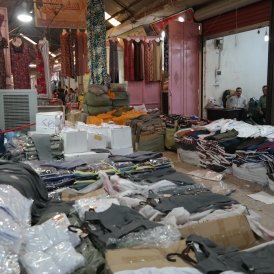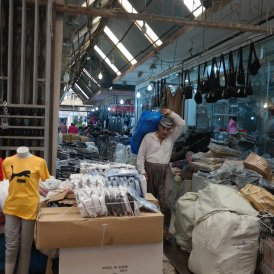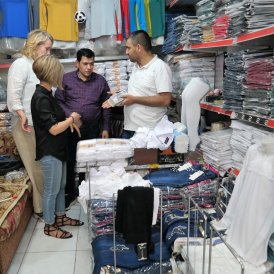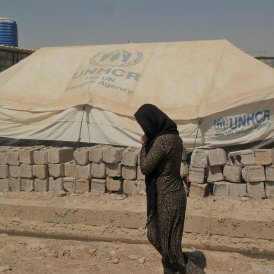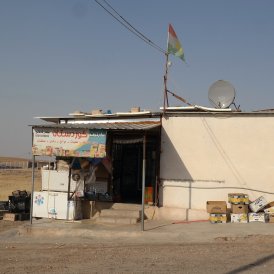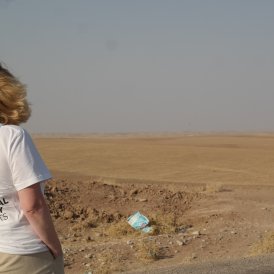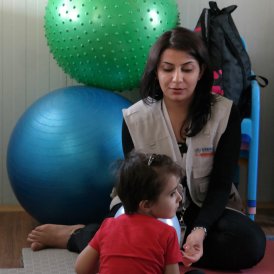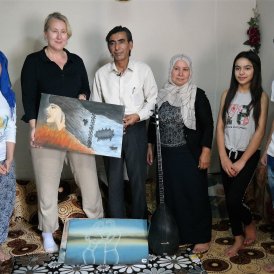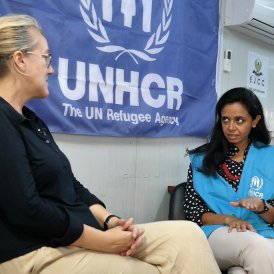IOHR distributes aid in Iraqi refugee camp in partnership with the Kurdi Foundation
14 September 2018Tima Kurdi, Syrian refugee advocate and co-founder of The Kurdi Foundation, spoke of the plight of Syrian refugees at the IOHR event on the 15 August 2018 at the National Liberal Club in London.
That evening, IOHR pledged to donate CAN$5000 from the Helping Hands Fund to The Kurdi Foundation to supply school supplies to children going to school in the little publicised refugee camps in the Kurdistan region of Iraq near the city of Erbil.
Two weeks later Valerie Peay, Director of IOHR made good on that pledge and journeyed to Iraq to join Tima and her brother Abdullah to source and deliver the aid that the Helping Hands Fund supported.
The first task was to source children’s uniforms directly from the local market to ensure investment was going to the Erbil community who support a hundred and twenty thousand Syrian refugees in their small area. The camp’s school head teacher had requested uniforms be supplied so that the children could feel they were all part of the same school, regardless of their current circumstance. They wanted to create a sense of belonging and deliver some of the magic of dressing up for school to encourage the children to attend. The School year begins in early October when the temperature drops from the desert heat of 45 degrees centigrade, but some classes are starting early to get newer arrivals up to the same level, so it was important to deliver the uniforms quickly.
The visit was arranged to Gawilan camp by the Kurdistan Regional Government (KRG) and Abdullah Kurdi. This is a remote site, which is managed by a Syrian team, situated in the desert of the Duhok region about 90 minutes drive to the north west of Erbil and 140Km from Duhok. The KRG provided a government car and officer to travel through the security check points, across the Euphrates river bridge that used to be ISIS held and on to camp. Due to the remote desert location of the camp, there is a curfew for camp residents from 6pm to 6am for their security.
Opened in March 2013, Gawilan camp is home to 8607 individuals; approximately 1972 households. The camp has 3 schools with 58% of children in the camp registered but class sizes are over 40 students to a class rather than the local average of 25. Those children that do not go to school go to work to help raise an income for their families. Children as young as twelve work in a local construction site and others travel into the cities to try and make ends meet.
IOHR visited the local school that Tima and her brother Abdullah had previously visited to deliver aid. There was soon an excited group of children following the progress of the unloading of the truck bringing the uniforms. The Helping Hands Fund was used to buy over 500 uniforms at the request of the camp Principal who spoke of the challenges faced in her school which included a leaking roof and a lack of teachers who were willing to be based in the camp full time.
The local Kurdish TV channel came to cover the distribution of the school supplies and to interview with Tima and Abdullah on the third-year anniversary of the loss of Abdullah’s family; his wife Rehanna and sons Ghalib and Alan. Tima has written passionately about the trauma of her family in her book “The Boy on The Beach” and there was considerable local interest in its recent publication.
IOHR Director, Valerie Peay, helped to sort and distribute the school uniforms and spent time speaking with the children to find out their favourite school subjects: Maths, English and Arabic. The children were prepared to stay out in the afternoon heat to ensure that they were able to get their new uniforms. Mothers clutched their official paperwork to prove that their children were enrolled in the school and the children beamed with pleasure when they finally got their new uniform. Valerie described the experience as “so humbling to see these bright alert kids living under breeze block and canvas, so thrilled to simply be like other children across Europe getting ready to start school. For less than £5 we can change a child’s experience and help them to want to come to school and learn.”
Tima and Abdullah spoke of their aspirations to extend the reach of the Kurdi Foundation to deliver more aid to different camps in Kurdistan but ultimately, they want to work back in Syria, building a school for children when they can return home.
Following the visit to Gwailan camp, Valerie met with the regional UNHCR representatives who hosted her at Qushtapa camp just outside Erbil to see first hand the work of the UNHCR teams working in partnership with local and international NGOs on the ground to deliver support to refugees living in camps but also living in the urban environments of Erbil and Dohuk.
UNHCR is responsible for liaising with the local government and managing all aspects of the refugees’ lives from basic needs such as housing and security working in tandem with multiple service providers to replicate all of the services of local government and health services in the UK.
The work of the UNHCR covers the 248,000 Syrian refugees registered in Iraq. 80,000 households, with 97% of them hosted in the Kurdistan region. In addition, the same region is now home to over a million internally displaced people (IDPs) due to the security situation caused by ISIS insurgents in Iraq. These displaced Iraqi people make up 20% of the local population seeking shelter in Kurdistan. Mosel is only a short drive across the dessert and local people speak of the very difficult situation of relatives still trapped there under ISIS rule.
In Erbil there are more than 120,000 registered Syrian refugees, accounting for 48% of the total Syrian refugee population in Iraq. 63% live in urban centres while 37% are in the local camps. Those who remain in the camps say they do so with hope of being selected to go to Europe or Canada. The urban dwellers have a better chance of finding work but there is a problem with meeting rents and finding work in a city now filled with IDPs also seeking work. The UNHCR works with over 80 partners to support and supply what they can for refugees, but there was a budget deficit of $125million in 2017.
The UNHCR team gave IOHR a full tour of the Qushtapa camp a 30 minute/24KM drive outside Erbil. There are four camps in the vicinity of the city each housing refugees predominantly from the Qamishli, Diralok and Hassaka region of Syria. Qushtapa houses 7900 refugees across 1819 plots. UNHCR works in association with sector specific partners and the Barzani Foundation; who manages Qushtapa camp. There are 3 schools with 73% of the children registered in full time education.
The camp was established in August 2013 with simple tents and has now almost completed an upgrade to give families a home-made of a concrete slab with breezeblock walls and a small kitchen and shower. IOHR was invited to visit with a local family who have been living in the camp since it opened. They hope to move to Germany or the UK to give their children the best opportunity for education. The father was an artist back in Syria who now paints his grief for the war-torn state of his country.
The summer temperature is almost 50 centigrade, but in the winter, it can drop as low as 10c. Although the breeze block walls can help, the family needs air-conditioning. However, with the frequent power cuts and water shortages, camp life can be difficult. The children spoke of their aspirations to be in Europe and to stop waiting for their lives to start again.
The camp feels organised and has an easy to follow structure of central shared areas. Small shops and a market line a children’s playground. Of course, it’s too hot to play in during the day, so the boys were under cover playing table football and talking about their favourite teams. The girls had a big tent where they were doing group exercises and could use an exercise bike.
The UNHCR team introduced the physio-therapist and psycho-therapist teams who were working with children who had suffered physical and mental trauma. Syrian families did not want to discuss any mental trauma issues in case there were ramifications however the teachers spoke of the need for more support to help more children.
The work of the UNHCR team on the ground was inspirational for the magnitude and scale of the issues that they need to manage on a daily basis. IOHR TV undertook an interview with Doaa Elbayed the regional protection officer of the UNHCR in Erbil to describe the work she and her team do and how they aim to develop their strategy moving forward.
The visit to the camps of Erbil highlighted the urgent need to bring more refugees to the UK.
IOHR calls on the UK and other European countries to increase the number of refugees who are given resettlement. The UK government scheme currently comes to a conclusion in 2020 so IOHR also supports the #ExtendTheWelcome campaign to petition for the government to extend the scheme indefinitely and give the next generation of Syrians the chance to learn while their homeland is rebuilt.
#BeARefugeeSponsor
(All figures regarding camp information from UNHCR, 2018)


